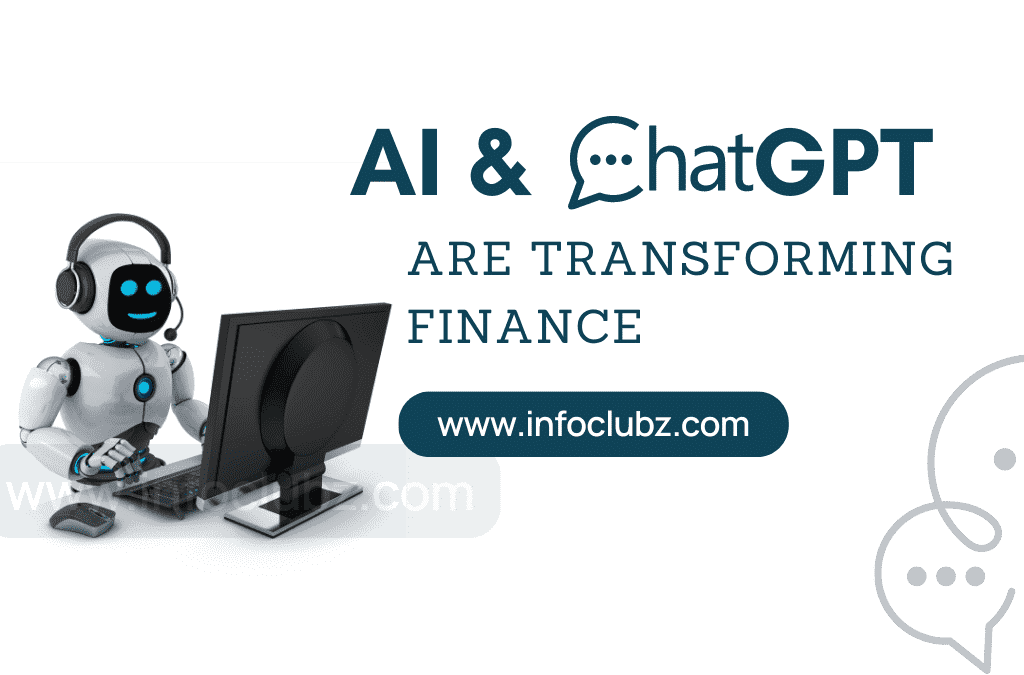- Introduction
- A Brief Overview of Artificial Intelligence (AI)
- The Evolution of ChatGPT
- AI in Finance: Past and Present
- The Impact of AI and ChatGPT on Financial Analysis
- Automating Financial Transactions
- Enhancing Customer Experience
- Risk Management and Fraud Detection
- AI-Powered Investment Strategies
- The Role of ChatGPT in Personal Finance
- ChatGPT in Wealth Management
- Regulatory Considerations for AI in Finance
- Ethical Implications of AI and ChatGPT in Finance
- The Future of AI and ChatGPT in Finance
- ChatGPT for Finance Professional
- Conclusion
- FAQs
Introduction
ChatGPT in FInance : Artificial Intelligence (AI) and its applications have transformed numerous industries, and finance is no exception. With advancements in AI technology, the finance sector is undergoing a paradigm shift in the way it operates. One remarkable development is the emergence of language models like ChatGPT, which have revolutionized the field of conversational AI. In this article, we will explore how AI, particularly ChatGPT, is reshaping the landscape of finance.
A Brief Overview of Artificial Intelligence (AI)
AI refers to the simulation of human intelligence in machines that can perform tasks that typically require human intelligence. Machine learning, natural language processing (NLP), and deep learning are some of the key components of AI. These technologies enable computers to analyze vast amounts of data, learn from patterns, and make predictions or decisions with minimal human intervention.
The Evolution of ChatGPT
ChatGPT, developed by OpenAI, is a cutting-edge language model that employs deep learning techniques to generate human-like text responses. It has undergone significant iterations and improvements to enhance its language understanding and generation capabilities. ChatGPT can understand and respond to user queries, engage in conversations, and provide relevant and contextually appropriate answers.
AI in Finance: Past and Present

The use of AI in finance has a long history, with early applications dating back to the 1980s. Initially, AI was primarily used for automating repetitive tasks and data analysis. However, with advancements in computational power and the availability of big data, AI has become a game-changer in finance. It has enabled the development of sophisticated algorithms and predictive models that can assist in decision-making, risk assessment, fraud detection, and more.
The Impact of AI and ChatGPT on Financial Analysis
Financial analysis involves interpreting large volumes of financial data to evaluate the performance and health of companies or investment opportunities. AI, coupled with ChatGPT’s conversational capabilities, has revolutionized financial analysis. It can quickly analyze complex financial statements, identify trends, and provide meaningful insights to analysts and investors. ChatGPT can answer specific queries related to financial data, saving time and effort.
Automating Financial Transactions

AI-powered chatbots, including ChatGPT, are being integrated into financial institutions’ systems to streamline and automate various processes. ChatGPT can handle routine customer inquiries, assist in opening new accounts, process transactions, and even provide personalized financial advice. This automation improves efficiency, reduces costs, and enhances the overall customer experience.
Enhancing Customer Experience
With the ability to understand natural language and engage in human-like conversations, ChatGPT offers a personalized and interactive experience for customers in the finance industry. Customers can obtain real-time assistance, ask questions, and receive tailored recommendations based on their financial goals and preferences. This level of engagement fosters trust and loyalty, resulting in a positive customer experience.
Risk Management and Fraud Detection
AI and ChatGPT play a crucial role in risk management and fraud detection within the finance sector. They can analyze vast amounts of data to identify patterns, anomalies, and potential fraudulent activities. By continuously monitoring transactions and user behavior, AI-powered systems can promptly flag suspicious activities and mitigate risks, protecting both financial institutions and customers.
AI-Powered Investment Strategies
Investment management is another area where AI and ChatGPT are making significant contributions. These technologies enable the development of sophisticated investment strategies by analyzing historical market data, identifying patterns, and predicting future market movements. AI-powered systems can provide recommendations on asset allocation, portfolio diversification, and risk management, helping investors make informed decisions.
The Role of ChatGPT in Personal Finance

ChatGPT’s conversational capabilities have the potential to transform personal finance management. Users can interact with ChatGPT to track their expenses, set financial goals, and receive personalized budgeting advice. By analyzing spending patterns and financial data, ChatGPT can offer insights and recommendations to improve financial health and achieve long-term goals.
ChatGPT in Wealth Management
Wealth management firms are leveraging ChatGPT to provide tailored financial guidance and investment advice to high-net-worth individuals. ChatGPT can understand clients’ financial objectives, risk tolerance, and preferences, assisting in creating customized investment portfolios. This personalized approach enhances the client-advisor relationship and helps clients achieve their wealth management goals effectively.
Regulatory Considerations for AI in Finance
As AI and ChatGPT become more prevalent in the finance industry, regulatory considerations are essential. Governments and regulatory bodies need to establish guidelines and frameworks to ensure transparency, fairness, and accountability in the use of AI. It is crucial to address potential biases in AI models, protect customer data, and maintain ethical standards while deploying AI-powered systems in finance.
Ethical Implications of AI and ChatGPT in Finance
The adoption of AI and ChatGPT in finance raises ethical concerns that need careful consideration. Issues such as data privacy, algorithmic bias, and the impact on employment need to be addressed. Financial institutions must prioritize ethical practices and develop robust frameworks for responsible AI deployment, ensuring that AI benefits society while minimizing potential risks.
The Future of AI and ChatGPT in Finance

The future of AI and ChatGPT in finance is promising. Advancements in AI technologies will further enhance the capabilities of ChatGPT and enable more complex financial analyses, sophisticated investment strategies, and improved customer experiences. As AI continues to evolve, financial institutions will need to adapt, embrace innovation, and leverage AI-powered solutions to stay competitive in the ever-changing landscape of finance.
ChatGPT for Finance Professional
As a finance professional, you may be wondering how ChatGPT can benefit your work and the finance industry as a whole. ChatGPT, powered by artificial intelligence (AI), offers numerous advantages and opportunities for finance professionals like yourself.
- Enhanced Financial Analysis: ChatGPT’s advanced language understanding capabilities enable it to analyze vast amounts of financial data quickly and accurately. It can assist in interpreting complex financial statements, identifying trends, and providing valuable insights for financial analysis.
- Improved Customer Experience: ChatGPT’s conversational abilities allow it to engage with customers in a personalized manner. It can handle routine inquiries, provide real-time assistance, and offer tailored recommendations based on individual financial goals and preferences. This level of interaction enhances the customer experience and builds trust.
- Efficient Risk Management: AI-powered systems, including ChatGPT, play a crucial role in risk management within the finance sector. They can analyze large volumes of data to identify potential risks, detect fraudulent activities, and promptly flag suspicious transactions. This proactive approach helps mitigate risks and protect financial institutions and their customers.
- AI-Powered Investment Strategies: ChatGPT can assist finance professionals in developing sophisticated investment strategies. By analyzing historical market data, identifying patterns, and predicting market movements, it can provide valuable insights for asset allocation, portfolio diversification, and risk management. This empowers finance professionals to make informed investment decisions.
- Streamlined Operations: Incorporating ChatGPT into financial systems allows for streamlined operations. It can automate routine tasks, such as transaction processing and customer inquiries, reducing manual effort and improving operational efficiency. This frees up time for finance professionals to focus on more strategic and value-added activities.
- Regulatory Compliance: ChatGPT can assist in regulatory compliance by analyzing financial data and ensuring adherence to relevant laws and regulations. It can help identify any anomalies or discrepancies, minimizing the risk of non-compliance and supporting regulatory reporting requirements.
It’s important to note that while ChatGPT offers significant benefits, it should be used in conjunction with human expertise. Finance professionals play a vital role in interpreting results, applying critical thinking, and making final decisions based on their domain knowledge and experience.
As AI and ChatGPT continue to evolve, finance professionals need to stay updated with the latest advancements, regulatory frameworks, and ethical considerations. Embracing AI technologies like ChatGPT can enhance your capabilities, improve efficiency, and drive innovation in the finance industry.
Conclusion
AI, alongside ChatGPT, is transforming the finance industry by automating processes, enhancing customer experiences, improving financial analysis, and enabling personalized wealth management. However, it is crucial to navigate regulatory and ethical considerations to ensure responsible and transparent use of AI in finance. As we look to the future, AI and ChatGPT will continue to shape the finance sector, unlocking new possibilities and driving innovation.
FAQs
- Can ChatGPT replace human financial advisors?
While ChatGPT can provide personalized financial guidance, it cannot entirely replace human financial advisors. Human advisors bring expertise, empathy, and a deeper understanding of complex financial situations that AI alone may not possess. ChatGPT can complement human advisors by assisting with data analysis and offering quick answers to specific queries.
- How does ChatGPT ensure the security of financial transactions?
ChatGPT itself does not handle financial transactions. However, AI-powered systems incorporating ChatGPT can have robust security measures in place to protect financial transactions. These systems utilize encryption, authentication protocols, and secure data storage to ensure the confidentiality and integrity of sensitive financial information.
- What are the challenges in implementing AI in finance?
Implementing AI in finance comes with challenges, such as data quality and availability, regulatory compliance, and the need for skilled AI professionals. Financial institutions need to address these challenges by investing in data management infrastructure, staying abreast of regulatory changes, and fostering AI talent within their organizations.
- How does ChatGPT address biases in financial decision-making?
Bias in financial decision-making can arise from biased training data or underlying algorithmic biases. Addressing these biases requires careful data selection and preprocessing, regular model monitoring, and ongoing evaluation of decision-making outcomes. Financial institutions using ChatGPT need to have robust frameworks to detect and mitigate potential biases.
- How can individuals benefit from ChatGPT in personal finance?
Individuals can benefit from ChatGPT in personal finance by leveraging its conversational capabilities to track expenses, set financial goals, and receive personalized budgeting advice. ChatGPT can provide insights and recommendations based on financial data analysis, helping individuals make informed decisions and improve their financial well-being.

